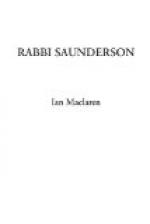[Illustration: He watched the dispersion of his potatoes with dismay]
“Yir neebur upbye, the General’s dochter, is cairryin’ on an awfu’ rig the noo at the Castle”—Kildrummie fell into dialect in private life, often with much richness—“an’ the sough (noise) o’ her ongaeins hes come the length o’ Muirtown. The castle is foo’ o’ men—tae say naethin’ o’ weemin; but it’s little she hes tae dae wi’ them or them wi’ her—officers frae Edinburgh an’ writin’ men frae London, as weel as half a dozen coonty birkies.”
“Well?” said Carmichael, despising himself for his curiosity.
“She hes a wy, there’s nae doot o’ that, an’ gin the trimmie hesna turned the heads o’ half the men in the Castle, till they say she hes the pick of twa lords, five honourables, and a poet. But the lassie kens what’s what; it’s Lord Hay she’s settin’ her cap for, an’ as sure as ye’re sittin’ there, Drum, she’ll hae him.
“Ma word”—and Kildrummie pursued his way—“it’ll be a match, the dochter o’ a puir Hielant laird, wi’ naethin’ but his half pay and a few pounds frae a fairm or twa. She’s a clever ane; French songs, dancin’, shootin’, ridin’, actin’, there’s nae deevilry that’s beyond her. They say upbye that she’s been a bonnie handfu’ tae her father—General though he be—an’ a’ peety her man.”
“They say a lot of . . . lies, and I don’t see what call a minister has to slander . . .”; and then Carmichael saw the folly of quarrelling with a veteran gossip over a young woman that would have nothing to say to him. What two Free Kirk ministers or their people thought of her would never affect Miss Carnegie.




